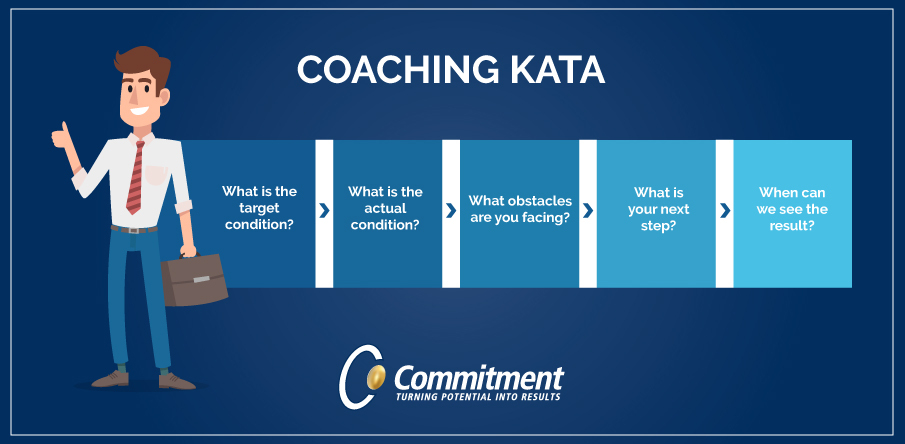We have recently developed a workshop for managers based on a tool called the Coaching Kata, kata being a Japanese word meaning a pattern or routine. By using this tool effectively, managers can encourage continuous improvement in their staff and business area.
If you’ve ever learned to play a musical instrument or sport, you probably remember learning a set of actions (a kata) and then practising this again and again. By repeating the routine, with regular observations and corrections from a coach, over time you formed good habits and you improved.
This same concept can be applied in the workplace, to drive a culture of continuous improvement. In his 2009 book Toyota Kata, the American researcher Mike Rother described the management and continuous improvement processes at the Toyota Motor Corporation. He then distilled his observations into two routines: the Improvement Kata and the Coaching Kata.
Rother’s Improvement Kata is a 4-step routine to encourage incremental improvement. It starts with deciding on an end goal, and then moves through understanding the baseline position, setting an intermediate target and then conducting a series of small experiments (changes) to move towards that target. During the experiments, a person measures their success, discusses it with a coach and learns from the process.
It’s a simple but important concept: don’t bite off more than you can chew. Instead, set intermediate goals and experiment with small changes to see what works. Be creative, learn as you go along, and never try to change too much at once. Each time you achieve an intermediate target, define the next target and start a new set of experiments to move towards it… and repeat, until you reach your end goal.
The Coaching Kata sits alongside the Improvement Kata. It is a routine that a manager uses to coach a person through the Improvement Kata. It includes a standard set of questions that the manager asks, to ensure that the Improvement Kata is being followed and the person is reflecting on their progress and learning.
One of the interesting things about the Coaching Kata is the mindset change it requires in both coach (manager) and the person being coached. Firstly, a manager has to stop telling people what to do. As managers, we are often directive with our staff, especially under pressure. The problem is that when we are directive, our team members don’t have to think for themselves, they don’t accept responsibility, they are less creative in solving problems, and they learn little. Yes, it is often quicker and easier to tell them what to do, especially when we have more experience and specialist knowledge. Also, staff often expect the managers to have all the answers. But directive leadership like this doesn’t drive staff to improve. Instead, following the Improvement and Coaching Kata, we ask questions that help our staff to find their own path to success.
The second mindset change is that by permitting our staff to conduct experiments, we also give them permission to fail. For many managers this is an unwelcome and alien concept, and in some risk-averse organisations it is counter-culture. But in reality, we learn as much from failure as we do from success. If the experiments are small, the mistakes should be small and manageable, and the risk is low. We all benefit from being allowed to make mistakes, as long as we learn from those mistakes and improve.
To conclude, this final thought represents the largest mindset shift. At Toyota, the Improvement and Coaching Katas are the daily method by which staff are managed, so these kata are not seen as an add-on task. At all levels of the company, everyone is a kata coach and everyone has a kata coach, so there are chains of kata coaching running up and down the company. Every day, managers ask the coaching questions to their staff, thus driving the staff and the business to continuously improve. It has taken Toyota many years to achieve this level of lean efficiency, but of course they did it in small steps, gradually. So… where could your organisation start the process?
For further information on how the Coaching Kata could help in your organisation, please contact us at Commitment. You can also find a range of supporting information at Mike Rother’s website: http://www-personal.umich.edu/~mrother/Homepage.html






